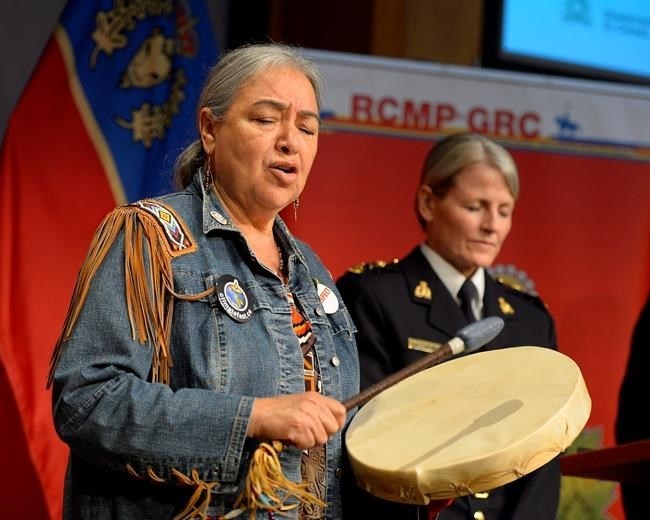
Elder Barbara Hill drums before the release of the RCMP Missing and Murdered Aboriginal Women: 2015 Update to the National Operational Overview Report, as Deputy Commissioner Janice Armstrong stands behind, in Ottawa on Friday, June 19, 2015.
Image Credit: THE CANADIAN PRESS/Justin Tang
June 20, 2015 - 10:30 AM
OTTAWA - Aboriginal women continue to be most frequently killed by men they know, the RCMP said Friday as it released updated findings on missing and murdered indigenous women.
Another 32 aboriginal women have been murdered and 11 more have disappeared since the force last reported on the issue 13 months ago. Its initial report put the tally at 1,181 murdered and missing women, between 1980 and 2012.
The RCMP said Friday that female victims, regardless of their ethnicity, continue to be targeted most often by men within their own homes and communities.
"There is an unmistakable connection between homicide and family violence," RCMP deputy commissioner Janice Armstrong said.
The RCMP data, based only on findings in areas under the force's jurisdiction, show that homicides of aboriginal women are solved in 81 per cent of cases, similar to the 83 per cent solution rate for killings of non-aboriginal women.
The statistics support a controversial claim made by Aboriginal Affairs Minister Bernard Valcourt.
In a closed door meeting with aboriginal leaders last March, Valcourt said 70 per cent of murdered aboriginal women were killed by aboriginal men. His comments infuriated several chiefs, who felt he was blaming aboriginal people for the problem.
The RCMP said its latest conclusions reaffirm prevention efforts need to focus on family violence.
"The relationship between the victim and the offender was particularly relevant in that over 90 per cent of the women represented within the homicide data were known to the victim," said RCMP Supt. Tyler Bates.
"Most often the offender was a spouse, a family member or an acquaintance."
Bates defined the acquaintance category as "primarily neighbours" or associates, although "criminal relationships" are also included.
Criminal relationships could include an encounter between a sex trade worker and a john as well as relationships between a drug dealer and a client, he said.
The Assembly of First Nations said the update is an urgent call to action to address a national crisis.
"We cannot ignore the evidence or the reality," said AFN National Chief Perry Bellegarde.
"There is a significant and tragic over-representation of indigenous women among the missing and murdered in this country. This is not just a First Nations issue, this is a Canadian issue and we all have a role to play."
The AFN has joined other aboriginal organizations and opposition parties to push for a national public inquiry to examine missing and murdered aboriginal women.
This call has also been supported by provincial and territorial premiers and the United Nations' special rapporteur on the rights of indigenous peoples, James Anaya.
The Conservatives continue to reject the idea of an inquiry, maintaining more study is not needed.
Valcourt did not comment Friday on the RCMP's update, leaving it to Status of Women Minister Kellie Leitch's office to respond on the government's behalf.
"These are terrible crimes against innocent people. The RCMP has said itself in its own study that the vast majority of these cases are addressed and are solved through police investigations," said Letich spokesman Andrew McGrath.
"We don't need yet another study on top of the some 40 studies that have already been done; we need police to catch those responsible and ensure they're punished."
Liberal aboriginal affairs critic Carolyn Bennett said the government owes more to the families of murdered and missing women.
"We will only be able to prevent this tragedy, stop this tragedy, by dealing with the root causes," Bennett said. "The current plan is not working."
News from © The Canadian Press, 2015